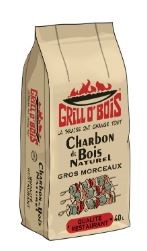Grill O' Bois (40 L)


FIELD
OBSERVATIONS
TRANSPARENCY
CARBON
Consumer information on the bag :

Declared Species
Feuillus européens

Certification
Information not communicated

Country of production
Lettonie, Ukraine

Producer / Importer
Information not communicated

Declared Species
Feuillus européens

Country of production
Lettonie, Ukraine

Certification
Information not communicated

Producer / Importer
Information not communicated

 teams during their field checks (environment, production, distribution, human rights, safety and transparency of the chain).
teams during their field checks (environment, production, distribution, human rights, safety and transparency of the chain).





















